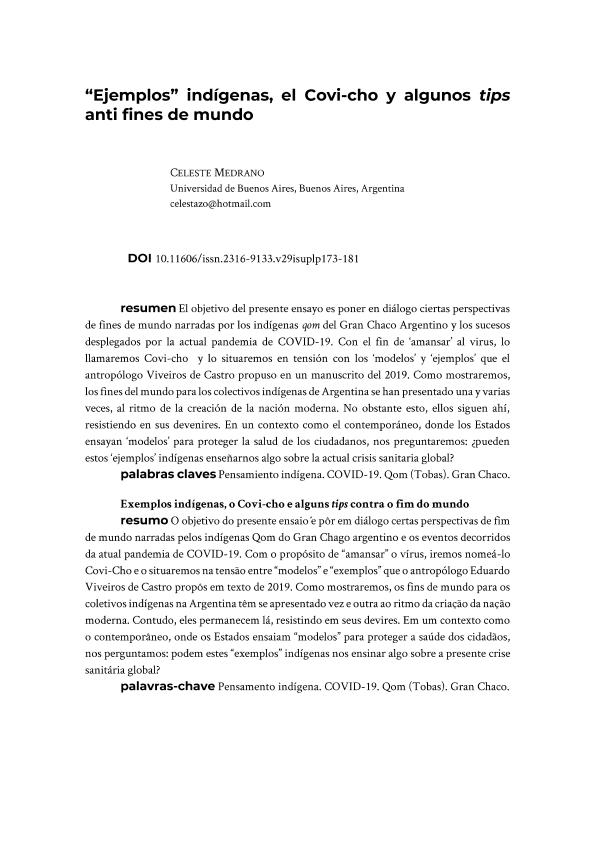Mostrar el registro sencillo del ítem
dc.contributor.author
Medrano, María Celeste

dc.date.available
2022-09-22T19:28:32Z
dc.date.issued
2020-08
dc.identifier.citation
Medrano, María Celeste; “Ejemplos” indígenas, el Covi-cho y algunos tips anti fines de mundo; Universidade de Sao Paulo; Cadernos de Campo; 29; 8-2020; 173-181
dc.identifier.issn
0104-5679
dc.identifier.uri
http://hdl.handle.net/11336/170067
dc.description.abstract
El objetivo del presente ensayo es poner en diálogo ciertas perspectivas de fines de mundo narradas por los indígenas qom del Gran Chaco Argentino y los sucesos desplegados por la actual pandemia de COVID-19. Con el fin de ‘amansar’ al virus, lo llamaremos Covi-cho y lo situaremos en tensión con los ‘modelos’ y ‘ejemplos’ que el antropólogo Viveiros de Castro propuso en un manuscrito del 2019. Como mostraremos, los fines del mundo para los colectivos indígenas de Argentina se han presentado una y varias veces, al ritmo de la creación de la nación moderna. No obstante esto, ellos siguen ahí, resistiendo en sus devenires. En un contexto como el contemporáneo, donde los Estados ensayan ‘modelos’ para proteger la salud de los ciudadanos, nos preguntaremos: ¿pueden estos ‘ejemplos’ indígenas enseñarnos algo sobre la actual crisis sanitaria global?
dc.description.abstract
O objetivo do presente ensaio é pôr em diálogo certas perspectivas de fim de mundo narradas pelos indígenas Qom do Gran Chago argentino e os eventos decorridos da atual pandemia de COVID-19. Com o propósito de “amansar” o vírus, iremos nomeá-lo Covi-Cho e o situaremos na tensão entre “modelos” e “exemplos” que o antropólogo Eduardo Viveiros de Castro propôs em texto de 2019. Como mostraremos, os fins de mundo para os coletivos indígenas na Argentina têm se apresentado vez e outra ao ritmo da criação da nação moderna. Contudo, eles permanecem lá, resistindo em seus devires. Em um contexto como o contemporâneo, onde os Estados ensaiam “modelos” para proteger a saúde dos cidadãos, nos perguntamos: podem estes “exemplos” indígenas nos ensinar algo sobre a presente crise sanitária global?
dc.description.abstract
The objective of this essay is to put into dialogue certain perspectives of the ends of the world narrated by the Qom indigenous people of the Argentinean Gran Chaco and the events unfolding by the current COVID-19 pandemic. In order to ‘familiarize’ the virus, we will call it Covi-cho and place it in tension with the ‘models’ and the ‘examples’ that the anthropologist Viveiros de Castro proposed in a 2019 manuscript. As we will show, the ends of the world to the indigenous groups of Argentina have performed once and several times, at the rhythm of the creation of the modern nation. Despite this, they are still there, resisting in their accretions. In a context like the contemporary one, where the States are testing ‘models’ to protect the health of citizens, we will ask ourselves: can these indigenous ‘examples’ teach us something about the current global health crisis?
dc.format
application/pdf
dc.language.iso
spa
dc.publisher
Universidade de Sao Paulo

dc.rights
info:eu-repo/semantics/openAccess
dc.rights.uri
https://creativecommons.org/licenses/by-nc-sa/2.5/ar/
dc.subject
PENSAMIENTO INDÍGENA
dc.subject
COVID-19
dc.subject
QOM (TOBAS)
dc.subject
GRAN CHACO
dc.subject.classification
Otras Humanidades

dc.subject.classification
Otras Humanidades

dc.subject.classification
HUMANIDADES

dc.title
“Ejemplos” indígenas, el Covi-cho y algunos tips anti fines de mundo
dc.title
Exemplos indígenas, o Covi-cho e algumas dicas contra o fim de mundo
dc.title
Indigenous’s "examples", the Covi-cho and some tips against the ends of the world
dc.type
info:eu-repo/semantics/article
dc.type
info:ar-repo/semantics/artículo
dc.type
info:eu-repo/semantics/publishedVersion
dc.date.updated
2022-09-22T15:06:17Z
dc.journal.volume
29
dc.journal.pagination
173-181
dc.journal.pais
Brasil

dc.journal.ciudad
São Paulo
dc.description.fil
Fil: Medrano, María Celeste. Consejo Nacional de Investigaciones Científicas y Técnicas; Argentina. Universidad de Buenos Aires. Facultad de Filosofía y Letras. Instituto de Ciencias Antropológicas. Sección de Etnología y Etnografía; Argentina
dc.journal.title
Cadernos de Campo

dc.relation.alternativeid
info:eu-repo/semantics/altIdentifier/url/https://www.revistas.usp.br/cadernosdecampo/article/view/170378
dc.relation.alternativeid
info:eu-repo/semantics/altIdentifier/doi/https://doi.org/10.11606/issn.2316-9133.v29isuplp173-181
Archivos asociados
